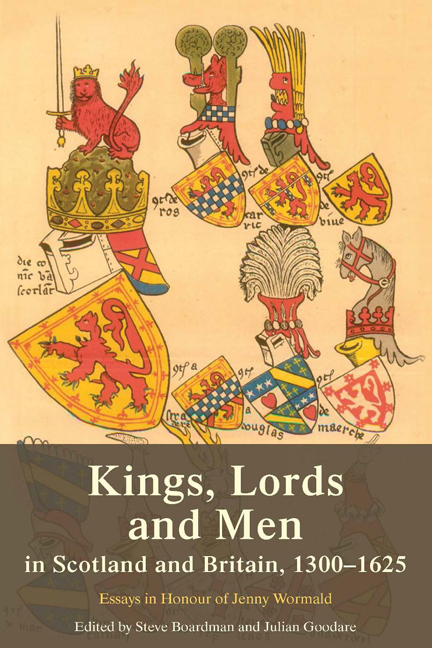Book contents
- Frontmatter
- Contents
- List of Illustrations
- Preface
- List of Abbreviations
- List of Contributors
- Introduction: Kings, Lords and Jenny Wormald
- 1 The Stewart Realm: Changing the Landscape
- Part I Lords and Men
- Part II Kings and Lords
- 9 Murder Will Out: Kingship, Kinship and Killing in Medieval Scotland
- 10 The Lanark Bond
- 11 James III: Kingship and Contested Reputation
- 12 Beyond the Declaration of Arbroath: Kingship, Counsel and Consent in Late Medieval and Early Modern Scotland
- 13 Royal Gifts and Gift-Exchange in Sixteenth-Century Anglo-Scottish Politics
- 14 The Ainslie Bond
- 15 ‘Scotland will be the Ending of all Empires’: Mr Thomas Murray and King James VI and I
- Publications of Jenny Wormald
- Index
15 - ‘Scotland will be the Ending of all Empires’: Mr Thomas Murray and King James VI and I
from Part II - Kings and Lords
Published online by Cambridge University Press: 15 December 2017
- Frontmatter
- Contents
- List of Illustrations
- Preface
- List of Abbreviations
- List of Contributors
- Introduction: Kings, Lords and Jenny Wormald
- 1 The Stewart Realm: Changing the Landscape
- Part I Lords and Men
- Part II Kings and Lords
- 9 Murder Will Out: Kingship, Kinship and Killing in Medieval Scotland
- 10 The Lanark Bond
- 11 James III: Kingship and Contested Reputation
- 12 Beyond the Declaration of Arbroath: Kingship, Counsel and Consent in Late Medieval and Early Modern Scotland
- 13 Royal Gifts and Gift-Exchange in Sixteenth-Century Anglo-Scottish Politics
- 14 The Ainslie Bond
- 15 ‘Scotland will be the Ending of all Empires’: Mr Thomas Murray and King James VI and I
- Publications of Jenny Wormald
- Index
Summary
That the remarkable monarch so long referred to by non-Scottish scholars as James I is today generally described as James VI and I is in no small measure the achievement of Jenny Wormald. Now that James is no longer seen as springing into existence out of a provincially irrelevant Scottish limbo in 1603, his early writings have received intensive study, effectively demolishing the traditional view of him as a lifelong Rex pacificus: the king himself wrote in 1619 that ‘I know not by what fortune, the dicton of PACIFICUS was added to my title, at my comming in England; that of the Lion, expressing true fortitude, having been my dicton before’. It is now clear that for some years, James took his leonine dicton seriously; with the publication of Ane Fruitfull Meditatioun contening ane plane and facill expositioun of ye 7.8.9 and 10 verses of the 20 Chap. of the Reuelatioun in forme of ane sermone (1588), Ane meditatioun vpon the xxv, xxvi, xxvii, xxviii, and xxix verses of the XV chapt. of the first buke of the Chronicles of the Kingis (1589) and Lepanto (1591), he had consciously positioned himself, the future monarch of Britannia, as the militant champion of all Europe's Protestants and the arch-enemy of the Papacy. An engraving that perfectly captures James in this role is reproduced as Figure 15.1; the armour-clad king originally appeared in three works by John Johnston (c.1570‒1611) published just before James mounted the English throne, namely Inscriptiones historicae regum Scotorum (1602), The Trewe description, of the nobill race of the Stewards, and the latter's Latin edition, Vera Descriptio (1602 and 1603).
The present chapter seeks to add a footnote to recent work exploring James’ own ‘armoured’ and ‘British’ thinking of the later 1580s, when writing and publishing his two Meditatiouns and the Lepanto, and the fact that in 1603, many of his contemporaries viewed the first king of Britain as a Protestant crusader.
- Type
- Chapter
- Information
- Kings, Lords and Men in Scotland and Britain, 1300-1625Essays in Honour of Jenny Wormald, pp. 320 - 340Publisher: Edinburgh University PressPrint publication year: 2014



